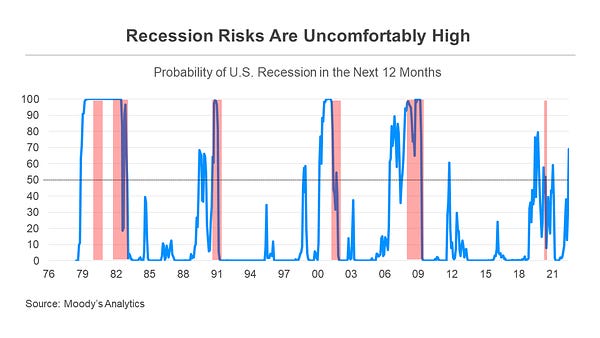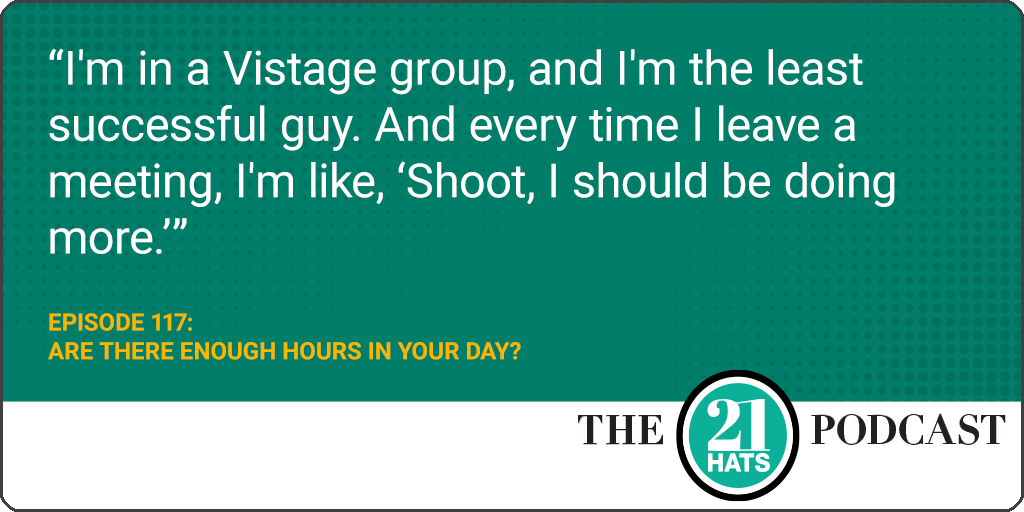Are There Enough Hours in Your Day?
In the latest 21 Hats Podcast episode, the owners talk about how their daily routines have evolved and whether they consider themselves successful.
Good morning!
Here are today’s highlights:
Are your sales really up? Or are you fooling yourself?
Why a restaurant owner is building his own network of farms in Black communities.
Maybe Silicon Valley was wrong and we don’t really need our groceries in 15 minutes.
Even a relentless heat wave may not be able to save the ice cream truck.
THE 21 HATS PODCAST
Are there enough hours in your day? This week, Paul Downs, Sarah Segal, and Laura Zander discuss their daily routines, how those routines have been affected by the pandemic, whether they think they’re working too much or too little, and whether they would join a peer group where they would be exposed to owners who are working harder and, perhaps, having greater success. Plus: Laura places her bet on influencer marketing, Paul says his new marketing campaign has already paid off, and Sarah explains why not one of her employees has ever asked her for a raise.
You can subscribe to the 21 Hats Podcast wherever you get podcasts.
ACCOUNTING
Gene Marks says business owners who think their sales are up may be fooling themselves: “I was recently at a client’s office to review their June 30th financials, and guess what? My client happily reported to me that her revenues were up over 10 percent! Woo-hoo, right? Well, not so fast. It’s true that — despite the warnings of a recession and some negative economic data — a fair number of my clients have been doing pretty okay this year. That’s not to say they’re not concerned about the second half of 2022. But at least for the first half, I can name many who had an increase in their sales revenues. Good for them. Good times. But hold on, let’s not fool ourselves. Did they really have an increase in sales?”
“The increase in revenue was really just due to price increases caused by inflation. And it was done to maintain margins. To say that sales revenues are up is, well, misleading.”
“Don’t be like my client and fool yourself into thinking that your business is growing when all you did was increase prices just to keep up with inflation.” READ MORE
PROFILE
A restaurant owner in Houston is trying to create his own food supply network by bringing Black people back to farming: “To address the lack of fresh produce and help residents reconnect with their farming roots, Chris Williams, the owner and chef of Lucille’s restaurant in Houston, is starting farms through his nonprofit, Lucille’s 1913. Planting began in April at the first location in Kendleton, on 12 of the 54 acres donated to the nonprofit by Fort Bend County. Residents will be hired to grow and harvest dozens of crops, including potatoes, collard greens, and melons, earning a higher hourly rate than they would at other farms.”
“During Reconstruction, people freed from slavery were integrated into communities across the South, including Fort Bend County, where many started farms. In Kendleton, land went for 50 cents an acre.”
“But systemic inequalities have long put Black farm operators at a disadvantage: They are likelier to have their properties undervalued and less likely to get bank loans. As a result, Black ownership of farms has declined, and Black-owned farms are smaller and generate less sales than others.”
“Half the produce from the farm will go into meals made by Lucille’s 1913, 25 percent will go to feed locals in need, and 25 percent will be sold at cost at Kendleton’s inaugural farmers market.” READ MORE
THE ECONOMY
Mark Zandi says we’re not in a recession (yet):


Walmart is cutting prices: “The country’s largest retailer, which warned in May that it was stuck with too much unsold goods, said on Monday that it was having to cut prices to reduce merchandise levels at its flagship chain and Sam’s Club warehouse chain. The markdowns will cause the company’s profits to fall in the second quarter and fiscal year. ... Walmart said higher prices for food and fuel have hurt sales of general merchandise, especially apparel, which generate higher profit margins for the company. Overall, the company expects comparable-store sales, excluding fuel, for its Walmart U.S. division to rise 6 percent in the second quarter from a year ago, but the growth is coming from less profitable items.” READ MORE
RETAIL
For some small businesses, the challenges just keep coming: “Kymme Williams-Davis was one of those who survived pivot after pivot, and she isn’t sure she can make it much longer. Seven years ago, she started a coffee shop in Brooklyn called Bushwick Grind, specializing in fair-trade beans that are locally roasted. She spent $200,000 building out the space with a kitchen, and developed a brisk business selling healthier fare than that of the fast food outlets around her. When the pandemic hit, the shop had to close for nine months. Ms. Williams-Davis made rent by subletting the space to other small vendors. When she reopened in 2021, she got a boost from a contract to deliver 400 meals a day to the city’s vaccine sites. That cash flow allowed her to qualify for a loan to buy her own space.”
“But she hasn’t been able to find anything in Brooklyn, in part because large investors keep outbidding her. Foot traffic hasn’t recovered.”
“The cost of coffee, kale and other provisions — if she can even get them — is skyrocketing. Farmers from upstate are saving on gas by taking fewer trips into the city, so she has begun to swap in lower-grade ingredients.”
“She had to limit her offerings, eliminating a brunch menu, because cooks kept leaving. Even after she raised starting pay to $24 an hour, she said, employees were lured away by the flexibility of gig work.” READ MORE
We may be seeing the last of the ice cream truck: “Owning an ice cream truck used to be a lucrative proposition, but for some, the expenses have become untenable: The diesel that powers the trucks has topped $7 a gallon, vanilla ice cream costs $13 a gallon and a 25-pound box of sprinkles now goes for about $60, double what it cost a year ago. Many vendors say the end of the ice-cream-truck era has been years in the making. Even the garages that house these trucks are evolving, renting parking spaces to other types of food vendors as the ranks of ice cream trucks dwindle.”
“Last year, when his slushy machine broke down, a part he needed cost $1,600. He decided to wait a few more months to fix it, but the part nearly doubled in cost, to $3,000. Now, the slushy is off the menu and the machine is sitting in his garage.”
“New delivery methods, through third-party apps or ghost kitchens, are proliferating. Brick-and-mortar scoop shops are focusing on offering a fun experience, he said, and serve dozens more flavors than a traditional ice cream truck can, driving lines away from these vehicles.”
“The ice cream truck, he said, is ‘unfortunately becoming a thing of the past.’” READ MORE
SILICON VALLEY
Do we really need our groceries in 15 minutes? “In 2019, investment in super-rapid grocery-delivery services reached $790 million; last year the figure climbed to $4 billion. But the wisdom of that influx seems increasingly dubious. Passing a possibly vacant fulfillment center on West 14th Street last week, I looked up the company behind it: JOKR. As it happened, the outfit had arrived in New York last summer, raised $430 million since, set up shop in Boston before Christmas and had already shut down its U.S. operations by June. A spokeswoman for the company explained that the focus was shifting ‘to become the leading and most customer serving online grocery business across Latin America.’” READ MORE
CANNABUSINESS
Cannabis-infused yoga classes are becoming a thing: “Around 20 states have legalized recreational marijuana—including New York in 2021—and high yoga is a budding activity. Sales of legal U.S. pot have grown into a multibillion-dollar business. At the same time, pandemic-era Zoom classes made yoga accessible to more people than ever before. Some in the yoga community find the pairing disjointed: Yoga Journal magazine has dubbed the tension the ‘Yoga and Weed Debate.’
“Ms. Hitz notices students in her cannabis-infused classes seem particularly flexible—and laid back. ‘Rather than being traumatized about falling out of a pose and having it wreck a class,’ she says, ‘it’s much more of a laughing matter.’”
“Kristine Weber, a yoga teacher and trainer who founded Subtle Yoga in Asheville, N.C., says she doesn’t take issue with marijuana smoking, but sees it as counterintuitive to yoga’s purpose. Substances ‘blur your reality. They blur your capacity for expansion,’ she says.”
“Cannabis has long been linked with yoga, says author and yoga instructor Dee Dussault, who founded Ganja Yoga, which offers cannabis-enhanced yoga classes and teacher training, in 2009. Ancient texts reference a plant used that is ‘something fragrant that makes you high and speak with the deities,’ she says.” READ MORE
THE 21 HATS PODCAST: DASHBOARD
“I Killed”: This week, Gene Marks reports back from a conference of funeral directors and debunks a silly survey that predicts a bleak future for small businesses. Plus: How the rules defining full-time employees and contractors could be changing, why some business owners are giving up on their CRM systems too soon, and how a relatively new law can help businesses save money administering retirement plans.
You can subscribe to the 21 Hats Podcast wherever you get podcasts.
If you see a story that business owners should know about, hit reply and send me the link. If you got something out of this email, you can click the heart symbol, you can click the comment icon below, and you can share it with a friend. Thanks for reading, everyone. — Loren



